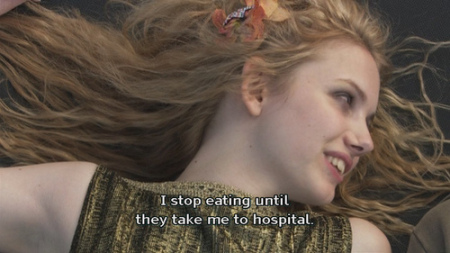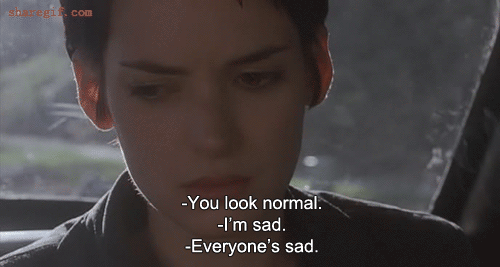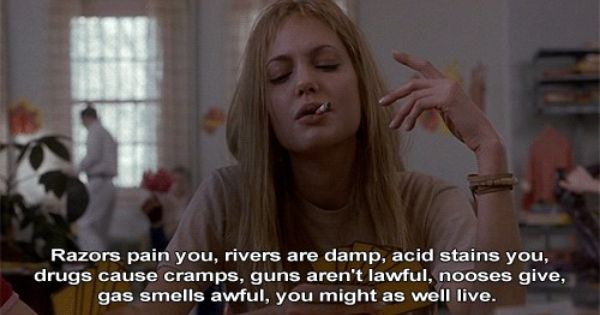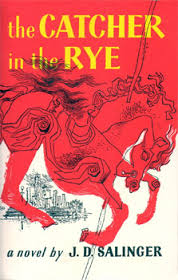When you write as openly about your personal experience of mental illness as I do, you expose yourself to a barrage of ill-informed and often insensitive questions and comments from people who believe they have a firm grasp of what it is like to have mental health issues, people who have absolutely no basis for this confidence in their own knowledge. From the hippy-dippy who tell you that you should eat more citrus fruits to improve your mood (who needs medication, eh?) to the Slimming World fanatics who think that it is completely acceptable to drop me a Facebook message asking for diet tips (yes, this has actually happened), I have had it all. And don’t even start me on the men who think that they are going to save my life by being Superman and loving me the way I could never love myself (puke). But I struggle to see any of these comments as malicious, preferring to have a little more faith in humanity than that. Instead, I think we must put the blame on the media and its distorted idea of what raising mental health awareness actually entails.
The exploitative nature of the media’s misrepresentation of mental illness is a regularly tackled issue but it has recently returned to the limelight with the growing popularity of Netflix sensation 13 Reasons Why. I personally cannot talk about said series because I honestly would rather spend my evenings tweezering my fingernails from their cuticles and then using my extracted fingernails to scoop my eyeballs out of my sockets than watch it. But this phenomenon is not only relevant to the latest hit, therefore I will try to explain my issues with how mental illness is presented in popular culture through examples that I am well-acquainted with.
Eating disorders receive little to no appropriate attention in dramatisations for reasons that are more practical than anything else: how is it possible to accurately depict the disintegration of the human form through self-starvation without putting your star at risk? That’s right, you can’t. Why, then, do producers insist that it is acceptable to employ a beautiful, young, NATURALLY AND HEALTHILY THIN actress in order to play the role of an anorexia victim when the need arises? Some of you may know where I am going with this. I can’t help myself; I have to talk about Skins.

I am constantly hearing Skins being glorified for its ‘true’ representation of what it is like to be a teenager in the noughties, allowing our young people to recognise that they were not alone; their struggles were the struggles of the masses. On the contrary, I personally found Skins particularly damaging. As a young teen who already possessed an unhealthy relationship with food but who had not yet spiraled into the murky depths of anorexia, the character of Cassie was particularly triggering. Sure, we saw her attend clinical appointments and experience mental anguish, but she had friends, partied hard, found love and, to top it all off, she was beautiful. Long flowing blonde locks, big Bambi eyes, pouty red lips…naturally beautiful. And she didn’t eat. Call me gullible all you want but for someone whose mind was already a little broken where food was concerned, Cassie seemed to provide me with the answer to all my problems: I just needed to commit to the starvation and I could be like her.
Skins failed. By employing the beautiful, model-esque Hannah Murray to play the suffering Cassie, they failed to warn our youth of the horrors of destructive eating disorders, instead managing to glamourise the fatal illness. They failed to show how starvation makes your skin fade, your teeth discolour, your hair fall out. They failed to show that there is nothing glamorous about a protruding tailbone making it impossible to sit down because the friction of a soft cushion against your fragile bones makes it too painful, midnight hot flushes because your body has tricked itself into thinking it has hit an early menopause because you haven’t had a period in three years…and don’t get me started on the fact that not even an entire pack of Wrigley’s Extra can take away the foul stench of a barren stomach which is craving nourishment. Yes, eating disorders quite literally stink. But Skins failed to show that, instead running a risk of birthing an entire generation of youngsters who pursue an impossible, grotesque dream. Instance Number 1 of the media’s mental health mis-awareness.

Rewinding a fair bit, a film which is very close to my heart is 1999’s Girl, Interrupted. In the depths of my despair, I watched this repeatedly and it is still an ongoing (if not slightly distasteful) joke among my friends and I that I possess a little bit of each of the girl’s personality traits within myself. What does that say about me, eh? From Winona Ryder’s Susanna’s recent diagnosis of borderline personality disorder to Angelina Jolie’s sociopath Lisa and even Brittany Murphy’s adoption of the role of sexually abused bulimic Daisy, all portrayals of illness in the film are actually quite accurate. Hoorah, problem solved!

Or not. I always remember garnering a strange sense of optimism from this film. I knew that I was experiencing a type of madness but there was hope: there was absolutely no way I could be alone. There is a world of girls out there experiencing the same things as me, and the camaraderie of the individuals in Girl, Interrupted, though at times disruptive and fractured, gave me a false impression that when I myself began attending a clinic that I would find my kindred.
This representation could not be anymore incorrect. For a start, you will never be friends with fellow patients. You’re lucky if you ever make eye-contact with another attendee, especially within the context of an eating disorder clinic; every other girl only offers the chance of a competition and comparison is ripe and destructive in such an environment. She’s skinnier than me: does that make me a failure? Why am I even here? I’m not even sick enough to be here…I can’t even be successful at being sick, for crying out loud…
Then there are your friends you have had for years who have also experienced mental health issues. These friendships are simultaneously the most cruel and the most beautiful. You will always be there for each other in your greatest hours of need but sadly there will be times when, without even speaking a word, both of you will acknowledge and recognise that your current mental state is unhealthy and damaging to the other, or vice versa. So, in a heartbreaking act of love, you drift apart and fall out of contact, knowing that the distance could save the other’s life. And suddenly you’re alone, all because you couldn’t risk hurting the one person who really understood your suffering.
90% of the time you will socialise with that group of friends in which you are the only one with serious mental health issues. And whilst their happiness, excitement and enthusiasm offers a lighthearted distraction from the darkness of your mind, this wave of optimism is only temporary. The next thing you know you are sitting in the smoking area of a pub with your more-than-slightly intoxicated best friend crying about how you don’t want to live anymore. And you know that by telling them that you are hurting them and you know how much they wish they could help but really you know that helping you is way beyond their capabilities. And you just can’t ignore the scared look in their eyes, like the best friend they once knew has become an alien they no longer recognise…
So, in short, Girl, Interrupted provided me with unrealistic expectations for the unbreakable bonds I was never going to make with a band of girls who were just as crazy as I am. Damn you, you beautiful bunch of 90s female icons…

My argument would be that film and television will never be able to fully communicate the mental processes of one suffering from such illnesses on a visual platform. These mental processes can only be communicated accurately through language, therefore the only true representation of mental illness and, in turn, the only way awareness can be raised is through literature. Right? Maybe…the issue is that quintessential texts famous and congratulated for their accurate portrayal of mental disintegration are usually limited based solely on the fact that they tend to be written from the perspective of an unreliable narrator whose individual experience is more than likely unique to them. Texts such as J.D. Salinger’s The Catcher In The Rye, Sylvia Plath’s The Bell Jar and even Stephen Chbosky’s The Perks Of Being A Wallflower were perfect companions for me when I needed them most (and I would recommend that everyone read each of these texts at some point in your lives), but I cannot ignore the possibility that these texts only resonate for a certain type of person. Namely that of the white Westerner. I am even isolated from the experiences described due to the fact that I am from the working class, unable to grasp the woes of the upper echelons of society, the middle classes to which the lead protagonists of each of these texts definitely belong. So even literature is handicapped in its ability to accurately represent the trials and tribulations of mental illness.

A new point of concern in this age of social media lies in the sharing and misunderstanding of material regarding mental health awareness. I am thinking in particular about the fad of spoken-word poetry about the experience of mental illness, made most notably popular by the YouTube channel Button Poetry.
I was first made aware of Button Poetry (like most people, I daresay) having stumbled upon Neil Hilborn’s unbelievable piece “OCD”. I can honestly say that I have never heard something that resonates with me so deeply and still shakes me to the core with every listening, the hairs on my arms finding it completely impossible to resist the temptation to stand on end each time. I knew that my experience of loving another and losing them was different to most people’s, and finally I had found someone who understood and had the words to describe this pain…
This poem means so much to me because Neil had the bravery I would never have to verbalise what it feels like to live with constant destructive thoughts ticking in your brain but to have these completely dissolve and fall silent when you find yourself with someone you genuinely care about. Romantically. Dare I say ‘love’? He also has the guts to openly acknowledge the complete breakdown that occurs in the obsessive individual when situations like this go awry.
Unfortunately, I have seen this video and others like it (namely Sabrina Benaim’s “Explaining My Depression To My Mother” and Anna Binkovitz’s “On Being Left”) being shared on social media platforms and being immortalised as romantic, having communicated an eternal love that we should all aspire to. I don’t know Mr. Hilborn and I don’t claim to know the thought processes that led him to write this piece, but speaking as someone who has OCD and has had the experience that he writes about, I am about 99.99999% certain that this is not the message he is trying to communicate. By definition, someone with OCD has an obsessive personality (no way, Niamh, really?). Living with an obsessive personality is extremely difficult, as obsessions can take many different shapes and forms. For example, I personally obsess about food, study, appearance, morality…the list goes on. Therefore, an individual with obsessive tendencies will often avoid romantic relationships for fear of being hurt or rejected. However, when Cupid shoots his little love arrows, who are we to tell him no? Those who share this poem with a caption of, “Awwww, *heart eye emoji*” close their ears and their minds to the suffering that these words tell of. They will never know what it feels like to finally find the one person who makes all those thoughts of self-hatred and the wrongs of your past go away just by being present, the one person who makes all your self-consciousness disappear because you know you are beautiful because in this moment you are happy and true happiness is true beauty…and then to learn that you can’t be with that person, for whatever reason. They will never know what it feels like to not sleep for months on end replaying one scene in your mind over and over again. They will never know what it feels like to want to tear your skin off because no matter how much you scrub and scratch, the trace and tingle of their fingertips will never go away. This is not romance. This, this is an accurate representation of mental illness.
Mental illness is a sensory experience. It’s the distorted sounds and voices of those around you, it’s the smells of the past that bring back painful memories, it’s the inability to taste anything for days because you have become completely and utterly numb to everything…so can we ever really create an accurate enough representation to raise adequate awareness on an aesthetic platform? I struggle to believe it is possible. And I would go as far as to argue that we either make an active effort to only provide documentary evidence, with no unrealistic dramatisations whatsoever, or we provide nothing at all, because anything that falls short of the appropriate mark, by its nature, becomes exploitative. Or maybe I’m just a bitter, mentally-ill hipster who is angry because my problems are coming into the mainstream. I’m not, but I daresay there are some who will read this article and arrive at this conclusion. Maybe this is too controversial an issue to be tackling on such a small scale…you decide.
-Niamhy xx